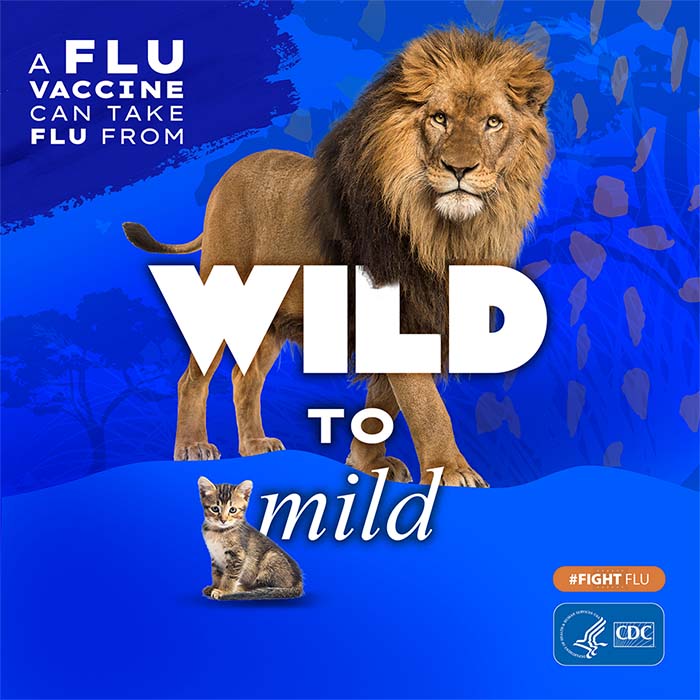What are the benefits of flu vaccination?
Prevention and Control of Seasonal Influenza with Vaccines: Recommendations of the Advisory Committee on Immunization Practices — United States, 2024–25 Influenza Season has been published. Updates to this page are forthcoming.
There are many reasons to get an influenza (flu) vaccine each year.
Below is a summary of the benefits of flu vaccination and selected scientific studies that support these benefits.
- Flu vaccination can keep you from getting sick with flu.
- Flu vaccine prevents millions of illnesses and flu-related doctor’s visits each year. For example, during 2019-2020, the last flu season prior to the COVID-19 pandemic, flu vaccination prevented an estimated 7 million influenza illnesses, 3 million influenza-associated medical visits, 100,000 influenza-associated hospitalizations, and 7,000 influenza-associated deaths.
- During seasons when flu vaccine viruses are similar to circulating flu viruses, flu vaccine has been shown to reduce the risk of having to go to the doctor with flu by 40% to 60%.
- Flu vaccination has been shown in several studies to reduce severity of illness in people who get vaccinated but still get sick.
- A 2021 study showed that among adults hospitalized with flu, vaccinated patients had a 26% lower risk of intensive care unit (ICU) admission and a 31% lower risk of death from flu compared with those who were unvaccinated.
- A 2018 study showed that among adults hospitalized with flu, vaccinated patients were 59% less likely to be admitted to the ICU than those who had not been vaccinated. Among adults in the ICU with flu, vaccinated patients on average spent four fewer days in the hospital than those who were not vaccinated.
- Flu vaccination can reduce the risk of flu-associated hospitalization.
- Flu vaccine prevents tens of thousands of hospitalizations each year. For example, during 2019-2020 flu vaccination prevented an estimated 100,000 flu-related hospitalizations.
- A 2018 study showed that from 2012 to 2015, flu vaccination among adults reduced the risk of being admitted to an ICU with flu by 82%.
- A 2017 systematic review found that during 2010-2011 through 2014-2015, flu vaccines reduced the risk of flu-associated hospitalization among older adults by about 40% on average.
- A 2014 study showed that flu vaccination reduced children’s risk of flu-related pediatric intensive care unit (PICU) admission by 74% during flu seasons from 2010-2012.
- Flu vaccination is an important preventive tool for people with certain chronic health conditions.
- Flu vaccination has been associated with lower rates of some cardiac events among people with heart disease, especially among those who have had a cardiac event in the past year.
- Flu vaccination can reduce the risk of a flu-related worsening of chronic lung disease (for example, chronic obstructive pulmonary disease (COPD) requiring hospitalization).
- Among people with diabetes and chronic lung disease, flu vaccination has been shown in separate studies to be associated with reduced hospitalizations from a worsening of their chronic condition.
- Flu vaccination during pregnancy helps protect pregnant people from flu during and after pregnancy and helps protect their infants from flu in their first few months of life.
- A 2013 study showed that during the 2010–2011 and 2011–2012 flu seasons vaccination reduced the risk of flu-associated acute respiratory infection in pregnant people by about one-half.
- A 2018 study showed that getting a flu shot reduced a pregnant person’s risk of being hospitalized with flu by an average of 40% from 2010-2016.
- A number of studies have shown that in addition to helping to protect pregnant people from flu, a flu vaccine given during pregnancy helps protect the baby from flu for several months after birth, when babies are too young to be vaccinated.
- Flu vaccine can be lifesaving in children.
- A 2022 study showed that flu vaccination reduced children’s risk of severe life-threatening influenza by 75%.
- A 2020 study found that during the 2018-2019 flu season, flu vaccination reduced flu-related hospitalization by 41% and flu-related emergency department visits by half among children (aged 6 months to 17 years old).
- A 2017 study was the first of its kind to show that flu vaccination can significantly reduce children’s risk of dying from flu.
- Getting vaccinated yourself may also protect people around you, including those who are more vulnerable to serious flu illness, like babies and young children, older people, and people with certain chronic health conditions.
Despite the many benefits offered by flu vaccination, only about half of Americans get an annual flu vaccine. During an average flu season, flu can cause millions of illnesses, hundreds of thousands of hospitalizations and tens of thousands of deaths. Many more people could be protected from flu if more people got vaccinated.
*References for the studies listed above can be found at Publications on Influenza Vaccine Benefits.

Flu is more dangerous than the common cold for children. Each year flu places a large burden on the health and well-being of children and their families.
Flu Vaccine Finder

Find flu vaccines in your area.
Everyone 6 months of age and older needs a flu vaccine.
